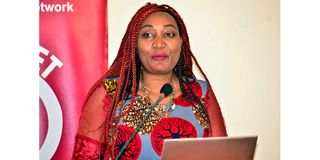Climate change: Listen to female voices, urge activists

African Women’s Development and Communication Network Executive Director, Memory Kachambwa. She says African women's participation in climate justice policy leadership is negligible.
What you need to know:
- Women rights activists are increasingly setting the agenda for the 66th session of the Commission on the Status of Women.
- African women's participation in climate justice policy leadership is still negligible.
- In last year’s climate talks held in Glasgow, Scotland, men accounted for 63 per cent of the total speaking time in plenaries.
As the 66th session of the Commission on the Status of Women (CSW66) nears, women rights activists are increasingly setting the agenda for the largest annual global gathering of gender equality advocates.
It is scheduled to take place on March 14-25, 2022, with discussions focusing on achieving gender equality and the empowerment of all women and girls in the context of climate change, environmental and disaster risk reduction policies and programs.
While core CSW66 sessions will be held in person, all side and parallel events will be conducted virtually.
Established in June 1946, Commission on the Status of Women is a functional commission of the United Nations Economic and Social Council (Ecosoc). Its annual gatherings are attended by representatives of UN member countries, UN entities, and Ecosoc-accredited non-governmental organisations.
Policy leadership
With the ongoing preparations, women rights activists are calling for meaningful participation of women in the talks.
“African women's participation in climate justice policy leadership is still negligible, for example out of 225 members of UNFCCC (United Nations Framework Convention on Climate Change) constituted bodies, only 75 are women and only 11 are African women,” said African Women’s Development and Communication Network Executive Director, Memory Kachambwa.
She spoke on February 21, during the virtual Africa pre-CSW66 expert consultation meeting jointly organised by UN Women, Women Gender and Youth Directorate of the African Union Commission, United Nations Economic Commission for Africa and United Nations Development Program.
“We urge African government delegations to ensure in-person participants to CSW66 includes feminists, women’s rights and civil society organisations,” she added.
In last year’s climate talks held in Glasgow, Scotland, 51 per cent of party delegations were men, shows a UNFCCC report. Men also accounted for 63 per cent of the total speaking time in plenaries.
In his remarks to the expert meeting, Maxime Houinato, UN Women Regional Director for East and Southern Africa, noted the urgency to listen to the voices of women and girls in tackling climate change.
“I urge you to centre the agency, voices and leadership of African women and girls,” he said.
“Be guided by women and girls ‘experiences in biodiversity conservation, sustainable food and agricultural systems as farmers, producers and knowledge holders,” he added.





